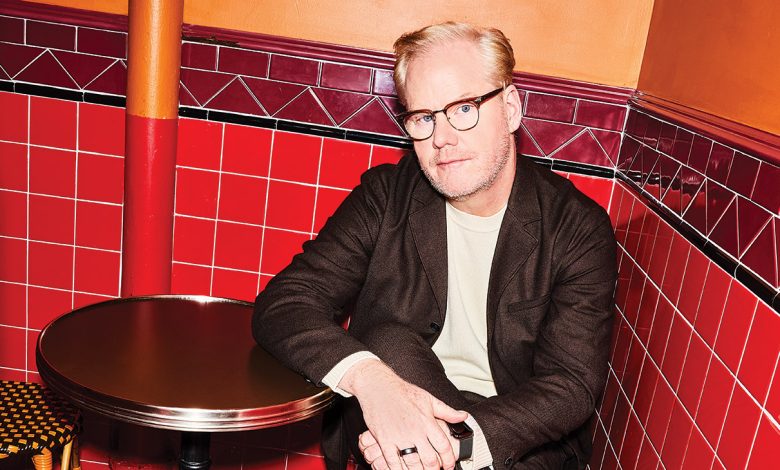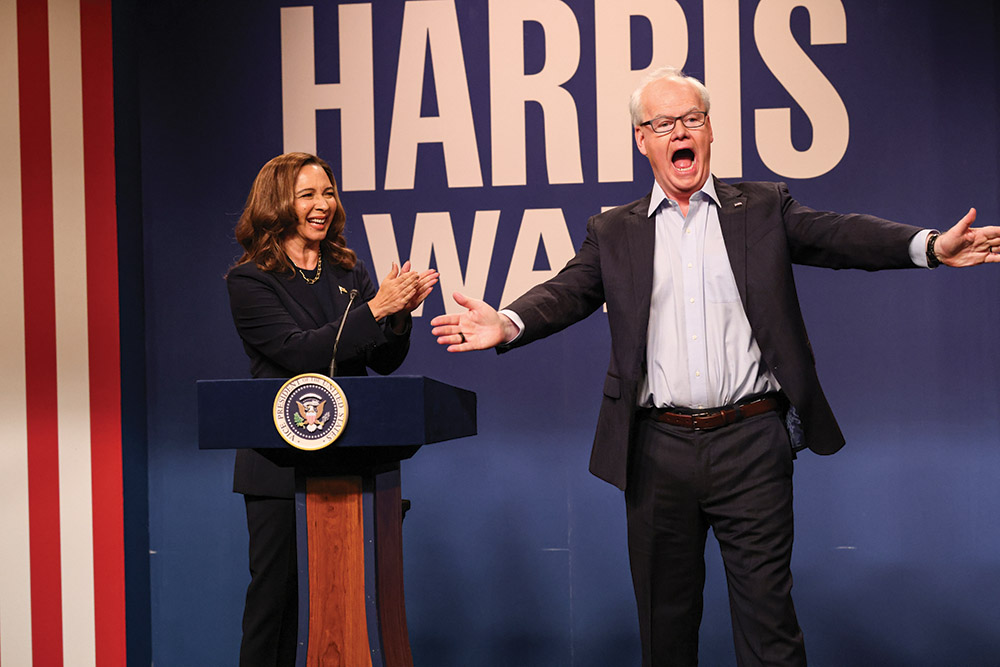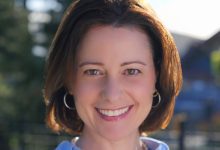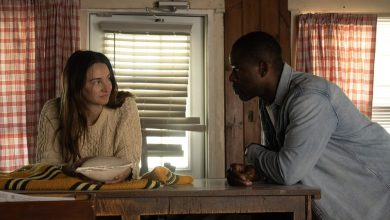Jim Gaffigan Is Finally Invited to the Party

“It is great to be here, I look good,” jokes Jim Gaffigan, who’s just sauntered out onstage for what will be his 11th stand-up special. “I don’t know if you know, but I’m normally a fat guy. But since I’ve lost all this weight, now I’m just arrogant.”
The Skinny, his new hour, will kick-start Hulu’s ambitious push into stand-up with monthly specials beginning Nov. 22. Gaffigan and his Mounjaro jokes will serve as the streamer’s guinea pig, a role he previously played at Amazon Prime Video back in 2019. In between, the Grammy-nominated comic, journeyman actor and CBS News Sunday Morning commentator released his special Comedy Monster on Netflix, still the 800-pound gorilla in a booming market.
“What Ted Sarandos has done is insane and contributed to comedians making an incredible living, but the dynamic has shifted, and the more players in this, the better for stand-up,” he says via Zoom from New York, where he’s just taken two of his five children with his longtime wife (and frequent collaborator), Jeannie, to vote on Election Day. And though our hourlong conversation wades heavily into politics — after all, Gaffigan’s just played VP nominee Tim Walz on Saturday Night Live and emceed the Al Smith charity dinner with now President-elect Donald Trump present — he doesn’t want his comedy to be political. Or, rather, his audience doesn’t want his comedy to be political.
So, how did you land the part of Tim Walz on SNL?
Once Steve Martin turned it down, me and some other doughy Midwestern types were pitched on social media because casting is now done by public referendum. But I’ve been around long enough to know there are certain things you just can’t campaign for, so I stood back. Then I got an acting job in the U.K. this summer and [my reps] call the night before and say, “Hey, so we’ve been kind of telling people that you’ve been doing these impressions of Tim Walz in funny messages to us.”
Had you?
I hadn’t. I was like, “Are you saying that I need to do some videos like that?” So there I was, in my hotel in Leeds, recording my impressions. It’s all so secretive, and you don’t know if it’s going to get to these people. It’s just a total roll of the dice. But I knew how to do it. I mean, me and Tim Walz, it’s not that different. He just has a brightness in him that I once had, [before] I lived in New York or worked in the entertainment industry for so long.

I assume your SNL run was always going to be over, post-election?
Contractually, I believe that was it. And I loved everything about it. As a comedian, it was like getting into Harvard for my graduate degree. But also, I’m touring and there are so many people to service in that cold open. There were times when I was like, “I hope Tim Walz does something strange so that I can have a bigger part,” which is a weird thing to hope for.
Your career took off when David Letterman anointed you on his show. What’s the 2024 equivalent?
It’s so fluid now. There’s a truly democratic element to stand-up today. It’s not a total meritocracy, but there’s something about Sebastian Maniscalco selling out six Madison Square Garden shows that’s just undeniable. Theo Von having that impact on the zeitgeist, you can’t deny that stuff. And Nate Bargatze, who did it without podcasts! [When I was coming up,] it was the Roseanne era. If you were a great comedian, you became a sitcom star. Tim Allen. Seinfeld. But now, stand-up as an industry has just exploded beyond anyone’s wildest expectations.
It’s also a very different America that comics traverse today. Does any aspect of your comedy or the response change as you travel?
This is, for lack of a better term, the Trump era. When he first won, I’d never talked about it. But the guy who opens for me, he went through periods where he would, and people wouldn’t respond negatively, they would just look at the ceiling. So, I stay out of it. People go to shows to escape, and there’s just a fatigue surrounding the two teams.
With folks like Joe Rogan, it can sometimes feel like comics are almost captains of those teams.
I did the Al Smith dinner, and I knew it was a no-win situation, but [I said yes because] I’m a history buff and a Catholic. I tried to do it very much down the middle and in the spirit of Bob Hope, but there were still people upset. I want to be able to look my children in the eyes, and I pride myself on a certain amount of authenticity, but I really do feel America is like, “We don’t need to know what you think.”
Depending on which outlet you read, you either destroyed Harris or you destroyed Trump.
It was so insane. And at points, I was probably this person, but there were a lot of people who are like, “How could you be in the room with that guy?” It’s complicated. I’m sure us even having this conversation, Rob [Gaffigan’s publicist] is going, “Cut it off! Don’t talk about this!”
Trump was mere feet from you as you were cracking jokes. There’s got to be some calculation of, “Do I go for it?” And, “How hard do I go?”
There were adjustments. We had this joke about RFK Jr. But once you’re in the setting, you’re like, “You know what? I’m not doing it.” Cheryl Hines was there. There’s no sense in an innocent bystander getting shrapnel on her.
You’ve long prided yourself on having the kind of audience where a Mormon couple could be seated beside two lesbians. Can that still happen today?
It can if your shows aren’t a piece of advocacy for either side. I’m doing these shows with Seinfeld and he’s very much of that mindset, where he has his own opinions but you don’t insert your ego or your political agenda. But, by the way, I understand that people feel powerless and want to do anything to make sure we avoid the end of our republic.
You’re considered a “clean” comic, which is a characterization that’s always irked you. Why?
The only adjective comedians want is “funny.” With categories on a streaming platform, “edgy” is more positive than “clean” — but I’m constantly looking for what to watch while I sit next to my 12-year-old. By the way, edgy is ridiculous, too. It’s lazy. [Editor’s note: On Netflix, Gaffigan’s specials fall under “Goofy,” “Marriage” and “Food”; they’re absent from “Provocative” and “Politically Incorrect.”]
A few years ago, you told Marc Maron that you were comfortable with your level of fame but wished it opened more acting doors. Has that changed?
The fame thing is less about ego and more about the opening of opportunity and being part of the conversation. But there is this naive expectation of the entertainment industry that Tom Hanks is going to invite you in, and that just doesn’t exist. That said, I love acting. Every time I go to Sundance, I’m thinking, “All right, this is the one. Now I’m going to be able to play Jesse Plemons’ older brother!” Going back to SNL, that’s what I wanted. Being at the afterparty and hanging out with Martin Short and Jon Hamm, I’m not the type who would just go to that party if I wasn’t on the show. So, having the unconscious invitation to be present is really an enormous relief. I assume that [the SNL exposure] has probably had some impact, but everything’s fast-moving. In the end, I’ll just be considered a really good-looking guy. So what am I going to do about that, right?
This story appeared in the Nov. 20 issue of The Hollywood Reporter magazine. Click here to subscribe.
Source: Hollywoodreporter
Related Posts
- Roundball Rocked: With NBA Return Looming, NBC Purges Scripted Roster
- SoundCloud Says It “Has Never Used Artist Content to Train AI Models” After Backlash on Terms of Service Change
- Fox News’ Camryn Kinsey Is “Doing Well” After Fainting on Live TV
- Kerry Washington and Jahleel Kamera in 'Shadow Force.'
Courtesy of Lionsgate
…
- This Alternative Artist Landed a Top-20 Chart Debut With an Album Made Almost Entirely on His Phone





